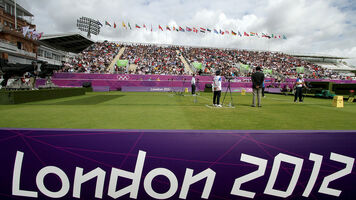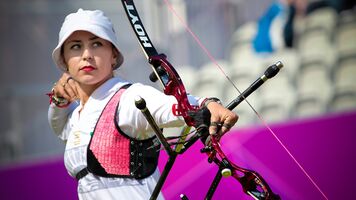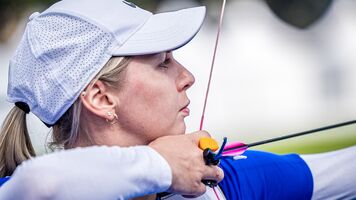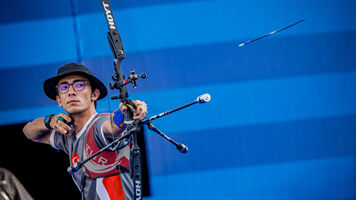Mexico at London 2012 part 1: Mariana Avitia makes history

“August 2nd 2012: the memories that come to my mind are many. It is a moment that was marked in my life. Everything comes to my mind as if it had been yesterday.”
Mexico is a nation firmly on the international archery map, and the country will be holding yet another World Cup Final this year in 2024, a full 18 years after it hosted the very first one in Merida in 2006. With a first women’s team medal in Paris alongside developing talent emerging, the country has fully become a powerhouse of the sport.
Mexico has had archers competing at the Games since the return of the sport to the Olympic programme in 1972, but the catalysing moment for the sport was at the London 2012 Olympic Games, when Mariana Avitia and Aida Roman won the first ever Olympic archery medals for Mexico.
This is Part 1. You can read about Aida Roman's story in Part 2.

The very first Olympic archery medal for Mexico was won by the 18-year-old Avitia, from Monterrey. She had started shooting in 2001 aged six, and went on to compete at the Beijing 2008 Olympic Games aged just 14 – the youngest member of the entire Mexican Olympic delegation. She finished in eighth place, with her teammate Juan Rene Serrano in a heartbreaking fourth place, after qualifying in first.
In London, Mexico fielded full teams of both men and women. Along with Roman and Avitia, it was the debut Olympics for Alejandra Valencia and a trio of Mexican men: Serrano, Luis Eduardo Velez and Luis Alvarez. All four were knocked out in the 1/16 eliminations round, with Alvarez losing to eventual gold medallist, Oh Jin Hyek.
In the team event, with matches still decided by cumulative points, the Mexican men finished in a frustrating fourth, losing the bronze medal match against Korea 224-219, while the Mexican women were eliminated in the quarterfinals by eventual bronze medallists Japan.
August 2nd 2012 was the women’s individual finals at Lords Cricket Ground. Korean coaching expertise was fully flying around the world by then, and coaches Lee Woong and Songi Woo were part of the Mexican setup.
Avitia had beaten Zahra Dehghanabnavi, Naomi Folkard, and Carina Christiansen, all by 6-2 scorelines, to set up a meeting in the last eight with Korea’s experienced Lee Sung Jin – already a multiple Olympic medallist.
Avitia lost the first set 26-29, but replied with an end of 27 to Lee’s 25. The third, critical set saw her put in a 30 to Lee’s 29, followed by a 29 to a 28.
A shock it might have been, but she was through – to face her teammate, Aida Roman.
“[Lee] was obviously seen as one of the favourites in those Games and when I eliminated her, everyone was paralysed because there was only one Korean and two Mexicans left,” Avitia recalls.
“Without a doubt, every archer I faced in those Olympic Games was a challenge and the best match for me was against the Korean in the quarterfinals. I watch the replay and I say 'wow, I shot very well, but at the end of the day archery is a surprise.”
Aida and Mariana, after looking at the bracket the night before, had joked 'see you in the semi' to each other, but that meeting was suddenly very real. “Before the quarterfinal I knew that if I won I was going to face Aida but it threw me off a little bit that we went in with only one coach.”
“We had two, there was coach Lee [Woong] and Miguel Flores. But coach Lee decided that he [Miguel] should not go in and said ‘I'm going in with the two of them’.”
“Miguel could very well have come in with me, but due to orders [from coach Lee] it was not possible. [He] was behind Aida and I was relatively ‘alone’. He (Lee) said that the medals were not ours, they were for the country.”
Perhaps distracted by the situation, both archers shot well below their day’s peak level, but Roman won the encounter 6-2, and would go on to face Ki Bo Bae in a classic women's final.
“I said to myself 'well, I'm shooting with Aida' and, to be honest, I got a little too relaxed as I was used to shooting with my teammate. At the end of that match I knew I had to change my mindset and go back to what I was doing before if I want to win bronze.” said Avitia.

There almost was no time to think – she was expected back out on stage immediately. The bronze medal match would be against another experienced archer, Khatuna Lorig of the USA.
“I knew I had the chance to win a bronze medal and I couldn't let it go. It was now or never and I was not going to stay with my arms crossed. I wanted to have that bronze medal with me and I put a lot of effort into it.”
Avitia opened with a 30, but had to maintain a rigid focus on the job. “In that match two things happened to Khatuna, I think, as I was very attentive to everything and focused on my game. The first thing was that she hit the little camera that was installed in the centre of the target and everyone started to applaud her.”
“I had to do my job while they were making a lot of noise. I said ‘it is what it is’.”
In increasingly windy conditions, Lorig shot a poor 6 in the fourth set, and Avitia had her chance.
“I saw the cone, the flags and thought that the wind is blowing in all directions. I just had to aim where I thought it might be and they landed well, but it still took me a while to shoot because of the wind that was moving me. Twenty seconds doesn't give you enough time. I had to shoot yellow at that moment in the last arrow – and I got it.”
Avitia had won Mexico’s first ever Olympic archery medal - and once again the scoreline was 6-2.

The focus of the day was finally broken in the medal ceremony. “You see all the dreams you wanted to fulfil as an athlete come true. You are receiving the medal for all the effort, for all the dedication and discipline you have had for many years.” said Avitia.
“It was incredible, a very, very big emotion seeing the two Mexico flags on the podium. It was really something beautiful. It is an experience that even gives you goosebumps, especially when they played the music 'Chariots of Fire' and that the stage was in my favourite colour, purple. It was as if everything was intended.”
“The moment when they give me my medal, when they read my name, I want to live it again. It is one of the most beautiful emotions I have had in my life, besides the emotion of becoming a mother.”
Avitia’s father was there to see his daughter win – despite almost not being allowed to travel due to heart issues. “My mum told me that she thought dad was on his last legs as he was walking in London and excited, shouting like crazy, like never before. Who was going to take that emotion away from him?”
As often happens, Olympic archery medals changed the course of the sport at home. “Many people in Mexico were impressed and began to practice but I would say after London 2012 was the ‘boom’ period. People saw our two Olympic medals and practically all of Mexico wanted to practice archery.”
“In Nuevo Leon where I live, there were so many children who wanted to start this sport, all because of the medals. They gave a lot of impact; they see you on TV winning and it will provide a motivation. We made history and at the same time helped a lot for the new generation.”
“It fills me with great pride and to know there are archers who started practicing because they saw me and others who went to the Olympic Games in Beijing and London. That I was the inspiration to practice archery and they are still practicing.”
Avitia was voted World Archery's Athlete Of The Year in 2013. She tried but failed to make the Olympic team for the Rio 2016 Olympic Games, with her last international competition medal coming at the 2019 Pan American Games. In Monterrey there is a ‘Mariana Avitia Archery Field’ at the Polideportivo Tigres Escobedo UANL (Autonomous University of Nuevo Leon).
Avitia and Roman opened the door for Alejandra Valencia, who grew to become the number one recurve woman in Mexico. Valencia came a frustrating fourth place individually at Rio 2016, but finally took home a mixed team medal in Tokyo followed by a team medal in Paris.
Avitia has much to say on the subject of pressure. “The truth is that you put pressure on yourself to want more, which is not bad, but you have to know how to measure it. You always want to improve, you want to be better. That's completely fine, that's not a bad thing, but stop thinking about the future and just do the right things that you are doing right now. Things will come out little by little. Just don't get ahead of yourself.”
“Now we are seen with respect and we hope it continues like that and that Mexico continues to see us with that respect and we win more Olympic medals in the future.”
With thanks to Guille Garcia.












